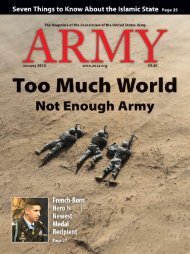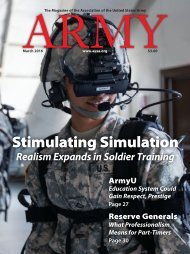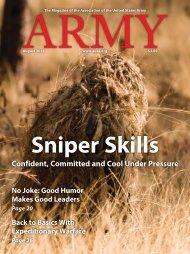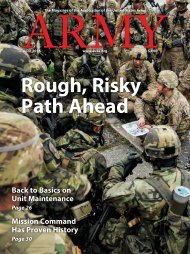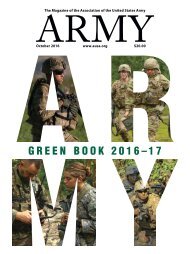Army - Kicking Tires On Jltv
Create successful ePaper yourself
Turn your PDF publications into a flip-book with our unique Google optimized e-Paper software.
The Outpost<br />
Fighting It Out at Chipyong-ni<br />
By Lt. Gen. Daniel P. Bolger, U.S. <strong>Army</strong> retired<br />
Retreat is not a word American soldiers like to use. You<br />
won’t find the term in <strong>Army</strong> field manuals. There are<br />
paragraphs on retrograde operations, to include delaying actions,<br />
withdrawals and retirements. But retreat? Well, that’s a<br />
ceremony at sunset when they lower the post flag. It sure isn’t<br />
a recommended battle tactic.<br />
Of course, doctrine is one thing while reality is another.<br />
Even a cursory review of U.S. <strong>Army</strong> history reflects several<br />
notable “retrograde” events: Gen. George Washington’s<br />
bedraggled Continentals fleeing British redcoats in New York<br />
and New Jersey in 1776; panicked Union troops legging it<br />
north after the Confederates had their way at the First Battle<br />
of Bull Run in 1861; and frantic G.I. backpedaling in the face<br />
of German panzers at Kasserine Pass in Tunisia in 1943.<br />
There are other examples, from Brandywine to Bataan. Few<br />
turned out well.<br />
But when it comes to retrogrades, or retreats, those of the<br />
first six months of the Korean War formed a particularly humiliating<br />
category all their own. First, in the hot summer of<br />
1950, the North Koreans ran the Americans south. Then,<br />
once the U.S. Eighth <strong>Army</strong> recovered and pushed north in the<br />
snows of an early winter, the Communist Chinese intervened,<br />
triggering a series of disastrous one-sided clashes, thousands<br />
of casualties and a wholesale rush south. U.S. <strong>Army</strong> trucks<br />
eventually outran Chinese foot soldiers. But the ignominious<br />
pullback generated a conviction up and down the ranks that<br />
something was seriously wrong with American morale, discipline<br />
and leadership—especially that last one. The troops who<br />
had won World War II couldn’t hold a hill in the face of peasant<br />
Chinese Communists with hand weapons.<br />
Senior officers did not use the “R” word. They mumbled<br />
into their wool winter shirts and hoped things would turn<br />
around. Maybe it was time to pull off this godforsaken Korean<br />
Peninsula. Or maybe it was time to drop the Big <strong>On</strong>e, the<br />
atomic bomb. But going at it man-to-man? There wasn’t much<br />
interest in that. Better to just leave—the ultimate retrograde.<br />
The troops also didn’t talk of retreat but they sang about it,<br />
to the tune of a popular Hank Snow hit:<br />
When the mortars started falling ’round the CP tent<br />
Everybody wondered where the high brass went<br />
They were buggin’ out—<br />
Just movin’ on…<br />
The generals and colonels tried to ban “Bugout Boogie.”<br />
But the soldiers kept singing it. Worse, they kept doing it.<br />
It’s hard to say where “Bugout Boogie” originated. Most<br />
thought it came from the embittered privates of the 2nd Infantry<br />
Division. That famous old outfit had been savaged trying<br />
to break contact with Chinese regiments at Kunu-ri dur-<br />
First Cavalry Division soldiers move north of<br />
Chipyong-ni, South Korea, in late February 1951.<br />
National Archives<br />
February 2016 ■ ARMY 57




